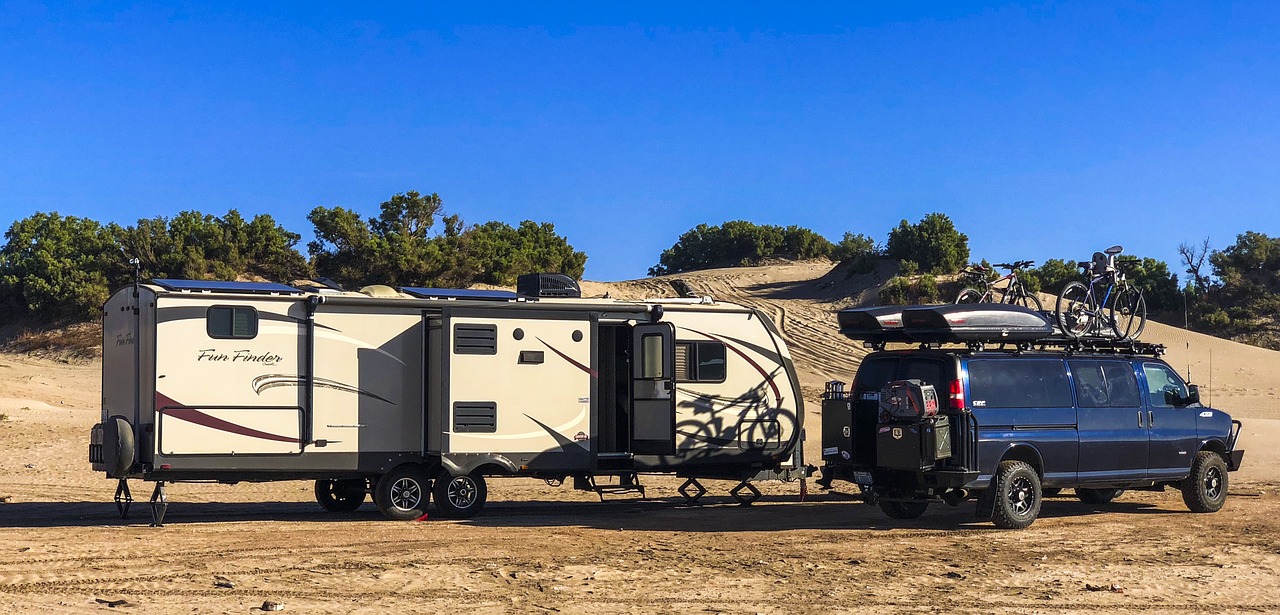Welcome to the world of RV camping, a unique blend of travel, adventure, and convenience. One of the most frequently asked questions by those considering this lifestyle or vacation choice is, “Is RV camping expensive?” In this blog post, I’ll delve into the various costs associated with RV camping, from purchasing or renting an RV, to maintenance, insurance, and campsite fees. I’ll also compare these costs to those of traditional vacations such as hotel stays or cruises.
By the end, you’ll have a comprehensive understanding of the financial commitment involved in RV camping and whether it’s a good fit for your budget and lifestyle. So, let’s embark on this journey to explore the ins and outs of RV camping costs!
What is RV Camping?
RV camping, also known as recreational vehicle camping, is a form of travel or vacation that involves living and traveling in an RV. An RV is a motor vehicle or trailer equipped with living quarters designed for accommodation. They range from the compact and simple, like campervans or truck campers, to the large and luxurious, like class A motorhomes, which can be equipped with amenities such as full kitchens, bathrooms, bedrooms, and living areas.
RV camping has grown increasingly popular over the years. It offers a unique blend of comfort, flexibility, and adventure that appeals to a wide range of people – from families and retirees to solo travelers and digital nomads. Whether you’re exploring national parks, traveling cross-country, or even just camping at a local site, RV camping provides the freedom of the open road with the comforts of home.
The appeal of having your accommodation and transportation combined allows for spontaneous travel plans, flexible schedules, and the ability to enjoy nature and outdoor activities while having a comfortable base. However, the costs associated with this type of travel can vary greatly, which is why it’s important to understand the potential expenses before setting off on your RV camping journey.
Breakdown of RV Camping Costs
Understanding the cost of RV camping involves several different components. Here’s a detailed breakdown:
- Initial Costs: Buying or Renting an RV The first major expense is the RV itself. If you’re planning to buy, prices can range from around $10,000 for a basic used travel trailer to over $300,000 for a new, luxury motorhome. If you’re not ready to commit to buying, renting is a great option. Rental costs vary depending on the size and type of RV, and the season, but on average, you can expect to pay between $100 to $300 per night.
- Operating Costs: Fuel, Maintenance, and Insurance Once you have your RV, there are ongoing costs to consider. Fuel is a major one, especially for larger motorhomes. Maintenance costs can include routine servicing, repairs, and replacement of parts. RV insurance is another crucial expense, and its cost will depend on factors like the value of the RV, your driving history, and the level of coverage you choose.
- Campsite Fees: Overnight Parking and Hookups Many RV campers stay at designated campsites, which charge fees for overnight parking. These can range from $20 to $80 per night depending on the location, amenities, and time of year. Many sites also offer electrical, water, and sewer hookups for an additional fee.
- Travel Expenses: Food, Attractions, and Activities Last but not least, you should budget for travel expenses. This includes food (both grocery shopping and dining out), admission fees for attractions, activities like hiking or fishing, and any other miscellaneous costs that come with travel.
Remember, these costs can vary widely depending on your travel style, the type of RV you choose, and how often and where you choose to camp. So it’s important to do your research and plan according to your budget and needs.
Comparison of RV Camping to Other Types of Vacations
Comparing the costs of RV camping to other types of vacations can provide a clearer understanding of whether this style of travel is right for you. Here’s how RV camping stacks up:
- RV Camping vs. Hotel Stays Hotel stays typically involve costs such as room rates, dining (as most hotels don’t have full kitchens), and transportation (rental cars, taxis, or public transit). While high-end RV camping can exceed the cost of a hotel stay, budget-conscious RV travel can often be cheaper, especially for families or groups who can share the cost, and for those who take advantage of cooking meals in the RV.
- RV Camping vs. Air Travel Air travel can be expensive, with costs for plane tickets, baggage fees, airport transfers, and accommodations at your destination. However, it’s a faster way to travel long distances. RV travel tends to be slower and more about the journey than the destination. If you’re traveling a short distance, RV camping can be more cost-effective, but for long distances, flying might be cheaper when factoring in the cost of fuel and time.
- RV Camping vs. Cruises Cruise prices can seem high initially, but they often include lodging, meals, and entertainment. However, extras like excursions, specialty dining, and onboard purchases can add up. RV camping provides more flexibility and can be a more economical option, particularly for longer vacations.
While cost is an important factor, it’s not the only one. Consider what type of vacation experience you’re seeking. RV camping offers unique advantages like travel flexibility, the comfort of having your own space, and the joy of nature and the open road.
How to Save Money While RV Camping
RV camping can certainly be an affordable way to travel if you know some money-saving strategies. Here are 8 tips to help you save money while RV camping:
- Choosing the Right RV: Renting or buying a smaller RV can save on both initial costs and fuel. Also, consider buying a used RV if you’re planning to purchase one.
- Plan Your Trip in the Off-Season: Campsite and RV rental fees can be significantly cheaper in the off-season. Plus, you’ll enjoy less crowded destinations.
- Cook Your Own Meals: One of the benefits of RV camping is having your own kitchen. Cooking meals instead of dining out can lead to substantial savings.
- Free or Low-Cost Campsites: There are many free and low-cost camping options available, especially if you’re willing to camp without hookups. Websites and apps like FreeCampsites.net can help you find them.
- Fuel Savings: Plan your route efficiently to save on fuel. Avoiding excessive speeds, maintaining your RV well, and not carrying unnecessary weight can also help improve fuel efficiency.
- Long-Term Stays: Many campgrounds offer discounted rates for longer stays, often significantly cheaper than the nightly rate.
- Join a Camping Club: Membership clubs like Good Sam or Passport America offer discounts on campgrounds, RV supplies, and more.
- Travel Insurance: Ensure you have travel insurance to avoid unexpected costs. Some credit cards offer travel insurance as part of their benefits.
RV camping is not just about reaching a destination; it’s about the journey. With smart planning, it can be an economical and enjoyable way to see the world.
Real-life Examples of RV Camping Budgets
To give you a more concrete idea of the costs involved in RV camping, let’s take a look at some real-life examples:
- Budget RV Camping Trip
- RV Rental: $200 per night for 7 nights = $1,400
- Fuel: $3 per gallon, 500 miles, 10 mpg = $150
- Campsite Fees: $30 per night for 7 nights = $210
- Food: $70 per day for 7 days = $490
- Attractions/Activities: $20 per day for 7 days = $140
- Total Cost for 1 Week: $2,390
- Mid-Range RV Camping Trip
- RV Ownership (annualized over 10 years): $5,000 per year
- Fuel: $3 per gallon, 500 miles, 10 mpg = $150
- Campsite Fees: $50 per night for 7 nights = $350
- Food: $100 per day for 7 days = $700
- Attractions/Activities: $50 per day for 7 days = $350
- Maintenance/Insurance: Approx $1,000 per year
- Total Cost for 1 Week (Excluding RV Purchase): $2,550
- Luxury RV Camping Trip
- RV Ownership (annualized over 10 years): $30,000 per year
- Fuel: $3 per gallon, 500 miles, 10 mpg = $150
- Campsite Fees: $80 per night for 7 nights = $560
- Food: $200 per day for 7 days = $1,400
- Attractions/Activities: $100 per day for 7 days = $700
- Maintenance/Insurance: Approx $3,000 per year
- Total Cost for 1 Week (Excluding RV Purchase): $5,810
These are just estimates and your costs could be higher or lower depending on various factors. Always plan your budget before starting your RV camping trip.
Conclusion
In conclusion, to answer the initial question – “Is RV camping expensive?” – the response largely depends on your personal preferences, travel style, and budget. RV camping can range from a budget-friendly way to see the country to a more luxurious, and therefore pricier, vacation option.
The costs associated with RV camping are multi-faceted, covering everything from the RV itself (whether rented or purchased) to operational costs, campsite fees, and everyday travel expenses. While it can seem daunting at first, with careful planning and smart strategies, RV camping can offer a cost-effective and rewarding way to travel.
Just remember, the value of RV camping isn’t solely measured in monetary terms. The freedom to explore, the flexibility of having your home on wheels, and the joy of being immersed in nature also contribute significantly to the overall RV camping experience.
Whether you’re an adventurer, a nature lover, or just someone looking for a unique vacation, RV camping provides a memorable and often affordable way to fulfill your travel dreams.
I hope this comprehensive guide has given you valuable insights into the potential costs of RV camping. If you’re considering embarking on an RV journey, these details should help you plan and budget effectively.
But remember, every RV camper’s journey is unique, and sharing experiences can be a great way to learn more. So, I invite you to join the conversation! Have you been on an RV camping trip recently? How did you find the costs compared to other types of vacations? What tips do you have for saving money while RV camping? I’d love to hear about your experiences in the comments below.
Also, be sure to check out other posts on RV camping. Whether you’re a seasoned RVer or just starting out, our blog is a treasure trove of helpful tips, inspiring destination ideas, and reviews of the latest RV gear.
Happy RV camping, and I look forward to seeing you on the road!
Must read:
Stationary RV Living Tips For Comfort, Freedom, And Community
Stationary RV Living Must Haves: Create Your Dream Home On Wheels!










